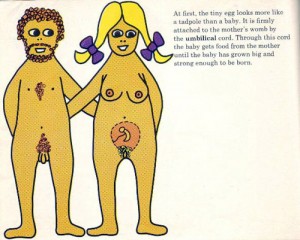 You know how, once you reached a certain age, your parents sat you down to have an uncomfortably awkward and likely uninformative talk about S-E-X? Yeah, me neither. Either I’ve repressed the memory of that traumatic conversation, or it never happened. All I remember is that one day, when I was 8 or 9, they gave me an illustrated book called “How a Baby Is Made.”
You know how, once you reached a certain age, your parents sat you down to have an uncomfortably awkward and likely uninformative talk about S-E-X? Yeah, me neither. Either I’ve repressed the memory of that traumatic conversation, or it never happened. All I remember is that one day, when I was 8 or 9, they gave me an illustrated book called “How a Baby Is Made.”
It was a revelation: Pictures of a man and woman, you know, doing it. Once I’d digested the relatively straightforward facts, I realized what I had in my hands—pornography! Parent-sanctioned pornography! As soon as I felt comfortable doing so, I sneaked it into my fourth-grade class, where my friends and I gawked at the pictures during recess.
I bring this up because I recently came upon (heh heh, “came upon”) the New Yorker’s brief, fascinating history of sex-ed books for kids, of which there are now a bewildering variety of sophisticated choices:
Where babies come from: that’s now baby stuff. Books for children older than about seven or eight cover that subject, but they’re more concerned with the perils of puberty, which is, apparently, scary as hell. “It is much, much harder to be a teenage girl now than ever before,” the gynecologist Jennifer Ashton argues, in “The Body Scoop for Girls: A Straight-Talk Guide to a Healthy, Beautiful You.” “Am I weird?” you wonder. “No!” Madaras insists. “You are not weird. You are 100% NORMAL! You’re just starting puberty.” Madaras’s books forever totter at the edge of an abyss of anxiety, as in a chapter called “B.O. & Zits: Is Puberty the Pits?” You’re a hundred per cent normal, but you stink, and if you would only be more careful about your grooming you could look so much better.
Frankly, I don’t remember being all that confused about the whole puberty-and-sex business. Maybe that’s because as a guy, I didn’t have to think about sanitary pads, or because in sixth grade we actually had real sex ed in school, an informative class in one of the most liberal parts of the country. More likely, though, it was because as a board-certified dorkwad, I didn’t have to face any of the implications of my changing body.
Certain issues, however, couldn’t be dealt with by books. Indeed, they were caused by books. I’m thinking of my fifth-grade experience with the beloved classic “To Kill a Mockingbird.” For all the novel’s fame and history, and its status as a Book Taught in Schools, it revolves around a question I wasn’t quite ready to deal with: Did Tom Robinson rape Mayella Ewell?
Now, I can’t remember if the word “rape” was actually in the book or not. But the concept was there, and it was something I couldn’t process. Racism? Sure. But not rape. Perhaps because I’d learned about sex from a book, it had remained something deeply abstract, and the violence and emotions of rape were simply too visceral. I actually temporarily switched out of that “Language Arts” class and into a lower one before everyone (parents, teachers) figured out where my reticence and lack of comprehension came from.
Looking back on it now, I wish my Dad had taught me about the birds and the bees the way Christopher’s father taught him: by dropping him off at a Newark whorehouse with a $100 bill and a fifth of rye. Anyway, that’s at least what I’m planning for Sasha.


